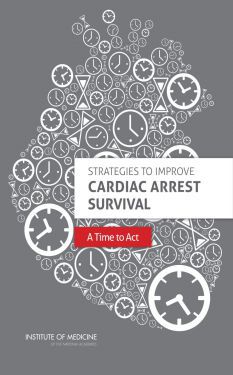
Cardiac arrest can strike a seemingly healthy individual of any age at any time, often without warning. Each year, more than half a million people in the United States experience a cardiac arrest. Using conservative estimates, it is the third leading cause of death, following cancer and heart disease, although more complete data is needed.
There are wide variations in survival rates among communities and hospitals—many due to variations in patient demographics and health status, geographic characteristics, and system-level factors affecting the quality and availability of care, such as bystander CPR rates. Time to first chest compression and defibrillation is fundamental, and shortening this time is one of the best ways to reduce the risk of death and disability from cardiac arrest.
Specific actions can be implemented now to decrease this time, and recent advances in science could lead to new discoveries in the causes of and treatments for cardiac arrest. However, specific barriers must first be addressed.
In Strategies to Improve Cardiac Arrest Survival: A Time to Act, the committee assessed the state of existing lifesaving therapies and strategies that could improve survival rates with good neurologic and functional outcomes, and promising next steps to improve the quality of care for cardiac arrest. On July 11-12, 2016, the National Academies of Sciences, Engineering, and Medicine will hold a public workshop in Washington, D.C. This workshop will engage a wide range of stakeholders in discussions about different approaches to respond to and implement the IOM recommendations, with emphasis on:
- Encouraging data collection and dissemination
- Promoting public education and training
- Improving delivery of high-quality resuscitation and post-arrest care
- Enhancing the impact of cardiac arrest research and therapies
- Strengthening stakeholder collaboration.
The planning committee will develop agenda topics, select and invite speakers and discussants, and moderate the discussions. Planning committee members are: Tom P. Aufderheide, MD, MS, FACEP, Medical College of Wisconsin; Dianne L. Atkins, MD, University of Iowa Carver College of Medicine; Lance Becker, MD, Hofstra School of Medicine; Richard N. Bradley, MD, FACEP, McGovern School of Medicine; Jeremy Brown, MD, National Institutes of Health; Marina Del Rios, MD, MS, University of Illinois at Chicago; Paul Pepe, MD, MPH, The University of Texas Southwestern Medical Center at Dallas; and Arthur B. Sanders, MD, University of Arizona.
Workshop sponsors are the American Heart Association, the American Red Cross, Medtronic, Physio-Control, ZOLL Medical, and the Sudden Cardiac Arrest Foundation.
Workshop staff are Rose Martinez, ScD., Board Director, and Meg McCoy, JD, MPH, Study Director.
The meeting is free and open to the public, but registration is required. To register or sign up for email notifications here.
To see the meeting agenda, click here or see attached.
For more information on the IOM report released last June, click here.
| Documents | Size |
|---|---|
| institute_of_medicine_-_agenda.pdf | 459.31 KB |
